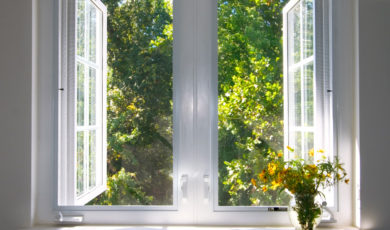Enjoy a Moment of Escape on These 12 Eco-Friendly Hotel Terraces
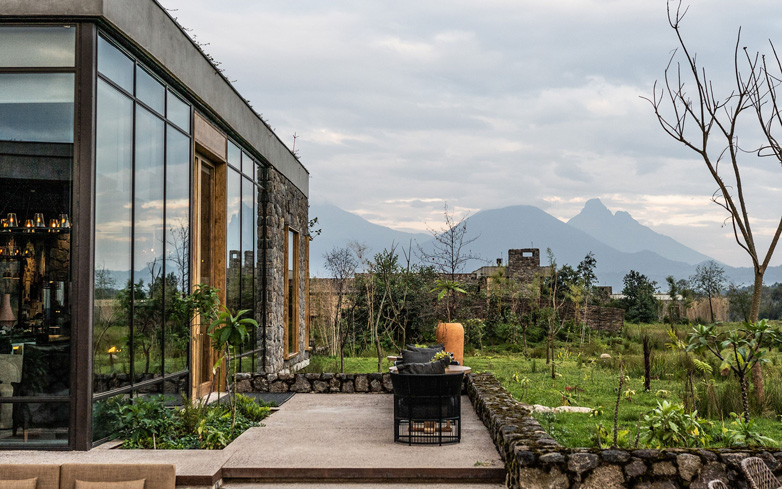
Wherever you are in the world, we’re willing to bet you’ve been having more vacation fantasies than ever before. And if you’ve been taking this time to reflect on your travel habits going forward, we’re right with you. Few things fuel the soul like taking in a breathtaking view, while knowing that your trip is helping preserve it. With more sustainable travel on the mind, check out our roundup of 12 of the world’s most inspiring hotel terraces that also benefit the planet and our communities, and be sure to follow or bookmark for your (eventual) visit!
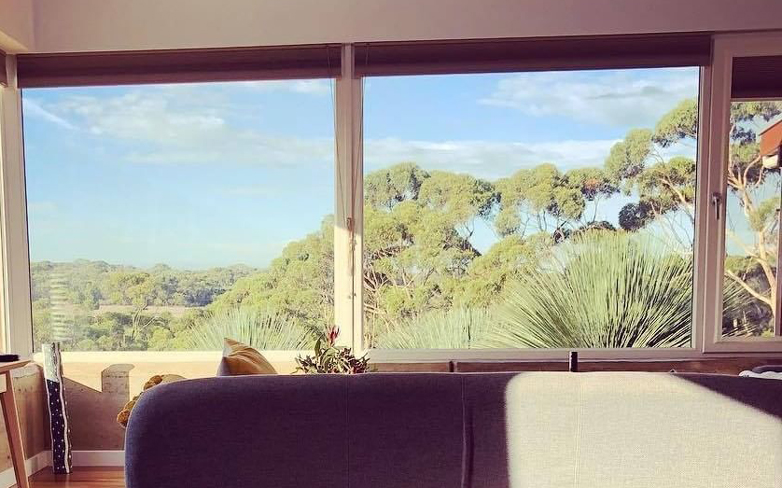
Ecopia Retreat
Where: Kangaroo Island, Australia
Instagram: @ecopiaretreat
Why it’s special: Robert Clements and Yael Katz built their boutique eco-luxury business on a remote wildlife sanctuary in 2018. Ecopia Retreat’s villas and residence lodge are completely off the grid, and each aspect has been hand-chosen and designed to create an experience in harmony with the natural world of Australia’s third-largest island.
How it’s doing good: Yael says, “We provide an authentic Kangaroo Island immersive experience for nature lovers, with a minimal environmental impact. Everything here has been considered, from the no-plastic commitment, to energy-efficient appliances, to the eco-friendly Australian cleaning products we use.”
The bushfires that ravaged Australia in late 2019 and early 2020 damaged a third of the property — about 50 acres. Yael and Robert took the effect on endangered species like the glossy-black cockatoos and koalas seriously.
“We thank our lucky stars that Ecopia was only touched by the fire, and not completely burnt,” Yael admits. “So far this year, we have planted 500 trees to rehabilitate the fireground and create further habitat for wildlife that has fled burnt areas west of us.”
The view: The wide-windowed terraces throughout the property bring guests to the doorstep of Kangaroo Island’s bushland and wildlife, including echidnas and the namesake marsupials.
Explore: Ecopia Retreat is a short drive from the island’s most pristine beaches, including Vivonne Bay and Emu Bay. Just down the road lies Kangaroo Island Spirits, a craft distillery where visitors can sample small-batch gin and enjoy signature cocktails.
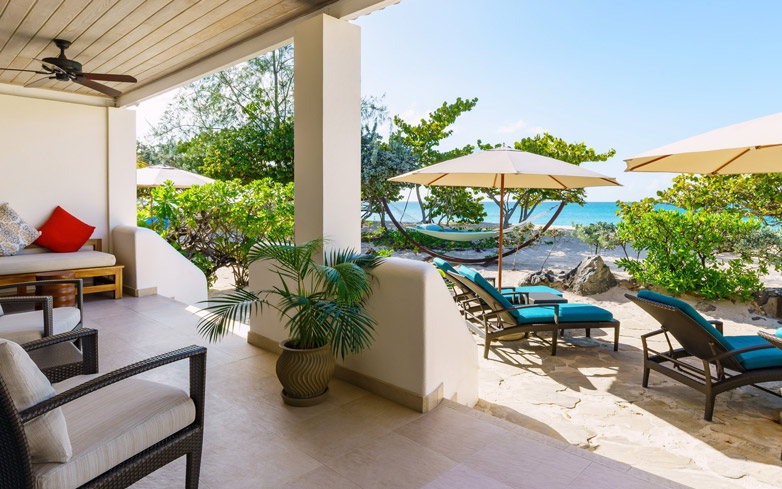
Spice Island Beach Resort
Where: St. George’s, Grenada
Instagram: @spiceislandbeachresort
Why it’s special: Spice Island Beach Resort is an all-inclusive boutique hotel owned and managed by the Hopkin family for over 30 years. The Green Globe-certified resort was among the first in the Caribbean with a comprehensive environmental program, according to Janelle Hopkin, the resort’s president and managing director.
How it’s doing good: “Sustainable initiatives at Spice Island Beach Resort include an on-property desalination plant, solar rooftop heaters for hot water, and converting all pools to saltwater pools in place of harsh chlorine.”
Janelle continues, “We empower each employee as an ‘environmental agent,’ with the necessary training and education on the resort’s environmental practices, policies and objectives. This way, they prepared to advise guests on the benefits of green practices, and they are also more adept at carrying out our eco friendly initiatives.”
The view: The resort’s 64 beachfront rooms treat guests to terraces on their very own section of the Caribbean. The Saffron Suite and the Seagrape Suite patios look like a veritable dream come true.
“All of the resort’s beachfront accommodations epitomize the importance of ‘location, location, location’,” Janelle says. “The same calm hum of the surf that gently wakes you in the morning lulls you into a nighttime slumber.”
Explore: Grand Anse Beach stretches for two miles along the island’s southwest coast, and resort guests have access to its white sands and crystal-clear waters when they’re not exploring the tropical gardens on the property or taking advantage of its world-class spa and culinary program.
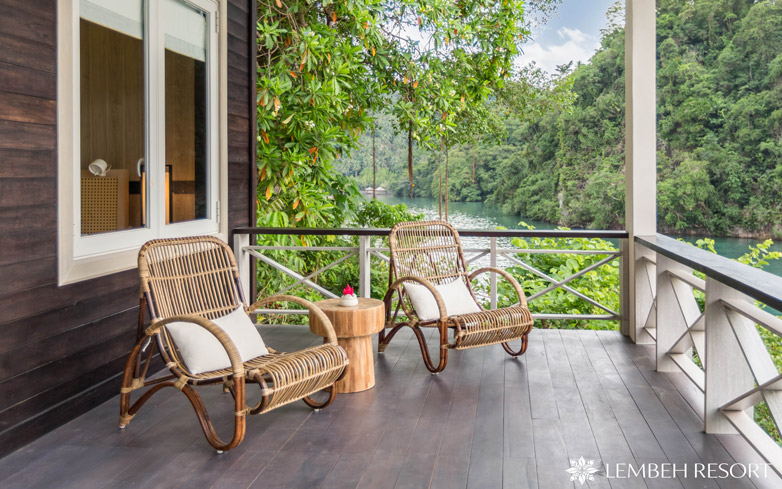
Lembeh Resort
Where: Indonesia
Instagram: @crittersatlembehresort | @lembehfoundation
Why it’s special: This family-owned boutique dive resort has been operating on a remote island off of North Sulawesi in the Lembeh Strait for nearly 20 years.
Kathrin Heussner, the resort’s general manager, aims to help each guest enjoy world-class diving, phenomenal wildlife and Indonesian hospitality.
How it’s doing good: The resort is well-known for its practical approach toward sustainability — visiting divers can participate in its cleanup initiatives on the shores of Lembeh Island as well as underwater.
“The Lembeh Foundation, our registered Indonesian charity, works together with local communities to reduce, reuse and recycle plastic waste, to increase awareness of environmental fragility through education, and to provide communities with economically viable ways to maintain a sustainable way of life, while providing financial opportunities and increased standards of hygiene and health.”
The view: We could go on forever about how happy these panoramas make us, but in short, the terraces off of each of the resort’s 20 rooms are sure to wow at any time of day.
“Dawn is often the most impressive, when the early morning mist rises from the surrounding jungle,” Kathrin says. “In the evenings, the sunsets over the ocean are nothing short of spectacular as the sun disappears behind the volcanic peaks on mainland North Sulawesi.”
Explore: After spending the day listening to Tarsier monkeys while floating in the resort’s gorgeous infinity pool, or out on a SCUBA diving trip, or checking out unforgettable marine biodiversity in an underwater photography class, guests can take advantage of Lembeh Resort’s first-class dining services.
“A remote location does not come at a culinary price at Lembeh Resort — almost unheard of in this region,” Kathrin adds.
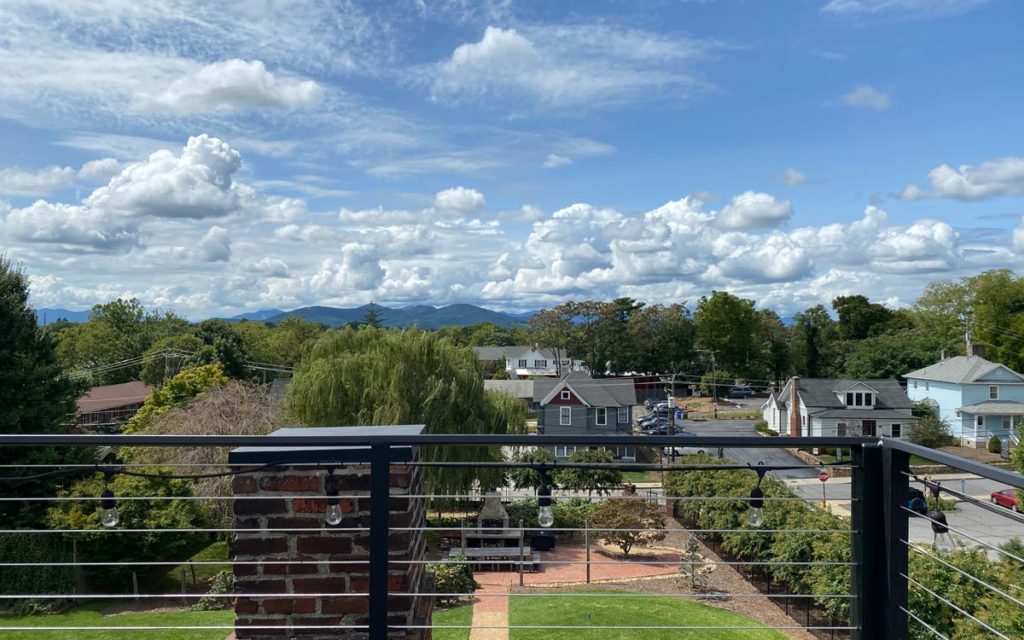
Bunn House
Where: Asheville, North Carolina
Instagram: @bunnhouse
Why it’s special: Bunn House is a six-room, family-owned property with a rooftop terrace located a short walk from downtown Asheville. It’s surrounded by lush gardens, a small vineyard, and a cozy outdoor fireplace.
Owner Ridgely Hutchin calls the boutique hotel “an oasis in the city because of its vast expanse of green space.”
How it’s doing good: Upcycling and reusing are central to daily operations since Ridgely began renovating the property in 2013. A classic example is the outdoor dining table: constructed from nearby trees, the remaining wood used for firewood and mulch.
“We took great care to be environmentally sound when planning,” she says. “We retained as much of the original structure of the house as possible. Bunn House utilizes geothermal heating and air conditioning, an electric vehicle charging station, ActivePure technology to clean the air, a water refill station, and recyclable coffee pods.”
As a reward for its sustainable efforts, Bunn House received the Adaptive Reuse Award from the Asheville Preservation Society.
The view: The rooftop terrace is the perfect place to curl up in a blanket with a glass of wine and relax while watching the sunset over a magnificent view of downtown Asheville and the Blue Ridge Mountains.
Explore: Asheville is the largest city in western North Carolina and a haven for outdoor enthusiasts.
“The gardens and estate allow for a peaceful getaway, and our central location offers guests easy biking access to the Blue Ridge Parkway,” Ridgely notes.

Singita Kwitonda Lodge
Where: Volcanoes National Park, Rwanda
Instagram: @singita_
Why it’s special: This property in northwest Rwanda features 2 of Singita’s 15 award-winning luxury lodges and camps. Singita is a legendary conservation and ecotourism brand, which has been working to preserve Africa’s wildlife and wilderness for nearly 30 years. The Kwitonda Lodge is named after a well-known silverback gorilla.
How it’s doing good:
“The design and construction of the lodge followed Singita’s stringent sustainability principles, which informed everything from site design and materials used to energy and water systems and interior design,” says Lydia Nzayo, General Manager. “The design team worked tirelessly with the local community to source most building materials in the immediate Musanze district.”
Akarabo, “little flower” in Kinyarwanda, is the on-site nursery that produces hundreds of thousands of indigenous forest shrubs, bamboo shoots and trees that contribute to the reforestation of the mountain gorillas’ natural habitat as a long-term goal.
The view: Volcanoes and a swim, anyone? Hand-laid terracotta bricks and volcanic stone surround the indoor and outdoor fireplaces and heated pools jutting out from each suite.
“The terraces open to views of the Virunga mountain range, featuring magnificent views of the Sabyinyo, Gahinga and Muhabura volcanoes,” says Lydia.
Explore: Guests have the opportunity to encounter Rwanda’s famous silverback gorillas and contribute to wildlife protection, which Singita Founder and Executive Chairman Luke Bailes calls “both a privilege and a serious responsibility.”
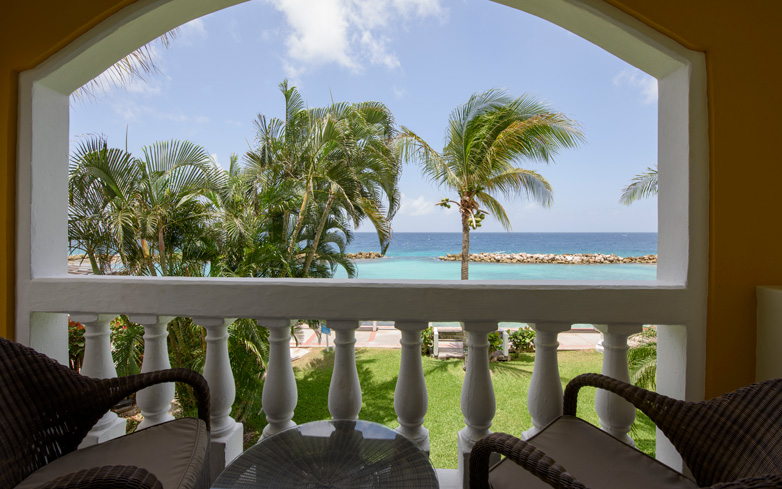
Avila Beach Hotel
Where: Willemstad, Curaçao
Instagram: @avilabeachhotel
Why it’s special: After 71 years of sunny hospitality, Curaçao’s Dutch family-owned Avila Beach Hotel is the oldest such property on the island. It’s known as the spot where lots of local couples get married and take their wedding pictures (no location fees are charged), and the hotel organizes culinary and music events for locals and tourists against a breathtaking Caribbean backdrop.
How it’s doing good: In addition to using solar panels and donating leftover food to a local pig farm, the three-wing hotel engages sustainability at the micro-local level by sponsoring the Oranjeschool, a neighborhood elementary school.
“Almost every employee of the hotel donates a small amount of their salary to the school each month,” according to General Manager Robbin Vogels, who took over hotel operations in 2016. “These donations are doubled by management and are used to invest in new computers, inverter air conditioners and a new library. We encourage our guests to help by joining our Pack for a Purpose project.”
The view: With oceanfront views galore and balconies hovering right over two private beaches, it’s hard to argue with Robbin’s assessment: “Our views are AWESOME!”
New beachfront apartments under construction will put even the most idyll Zoom background to the test.
“You can’t get any closer to the sea than right here at our resort,” Robbin says.
Explore: The hotel is located near the island’s city center in the lively and historic Pietermaai District. Robbin recommends that guests explore the dining options within walking distance and photograph the neighborhood’s Insta-worthy buildings along the way (the beautiful murals and vibrantly painted houses are impossible to miss).
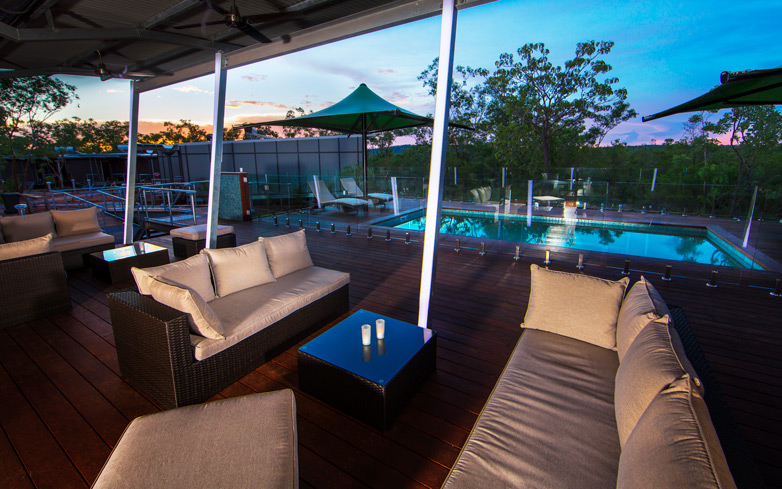
Cicada Lodge
Where: Nitmiluk Gorge, Australia
Instagram: @cicadalodge | @nitmiluktours
Why it’s special: The 18-roomCicada Lodge is situated in Nitmiluk National Park near the Katherine River on Jawoyn Land, in the Top End of Australia’s Northern Territory. It’s run by Nitmiluk Tours, a 100% Indigenous-owned tourism operation covering nearly 20,000 square miles and offering exclusive tours through the breathtaking Nitmiluk Gorge.
“Nitmiluk is a destination that brings together cultural, nature and adventure experiences,” says Chief Operating Officer Sveva Falletto.
How it’s doing good: “Elders developed tourism around Nitmiluk National Park to ensure the economic and cultural sustainability of one of the world’s oldest living cultures: the Jawoyn people,” Sveva says. “Some of the best-preserved artwork can be found on Jawoyn land.”
“The Nitmiluk Tours business vision is to create authentic and unforgettable holiday experiences, to share and sustain the ancient cultures and stories of the Jawoyn people, and to drive Aboriginal tourism.”
The view: Private balconies and a large poolside terrace open up to views of the mighty Katherine River, encouraging native birds to stop by and say hello amid the surrounding vegetation.
“The atmosphere is magic, and the terrace is also a special spot during the wet season, where guests can enjoy the spectacular lightning storms on the other side of the escarpment,” Sveva says.
Explore: Adventure calls visitors to enchantingly remote spots like the Baruwei Lookout and neighboring Kakadu National Park. Experienced Indigenous guides can show guests the most unique parts of the region.
“Cicada Lodge provides a base from which our guests can take part in experiences very few get the chance to do,” Sveva continues. “including visiting ancient rock art sites rarely open to public viewing, sampling native bush foods and medicines deep in Jawoyn land, or swimming in pristine water holes accessible only by helicopter.”
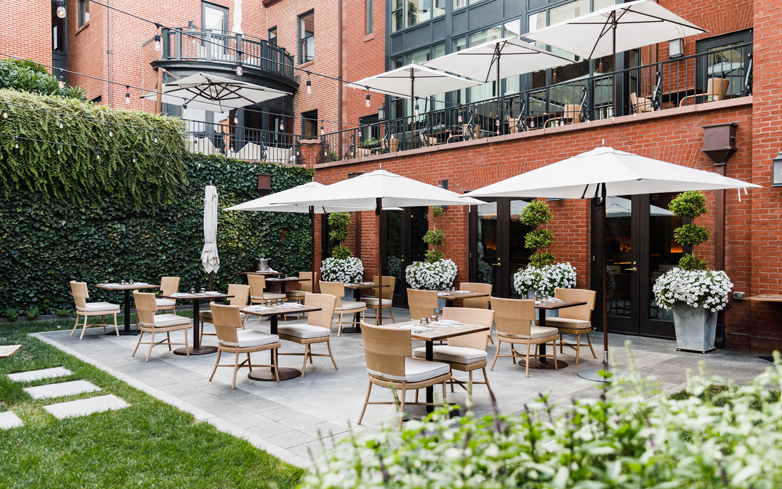
The Ivy Hotel
Where: Baltimore, Maryland
Instagram: @theivyhotel
Why it’s special: Baltimore’s expansive waterfront life plays into the character of this chic eight-suite, ten-bedroom accommodation conveniently close to the city — but far enough away from the bustling downtown for guests to catch some relaxing vibes.
“Our restaurant, Magdalena, sources ingredients close to home and focuses specifically on environmentally responsible seafood found in Maryland,” says Marketing Manager Ali Lord Pannoni.
How it’s doing good: Beyond the shore, the Ivy’s Nordaq water filtration system eliminates the need for plastic water bottles in the hotel, restaurant and spa. The building itself is LEED silver certified and features an electric vehicle charging station and other green amenities.
“We strongly believe that every small daily choice adds up in working towards a more sustainable future,” Ali explains. “We are constantly striving for improved environmental sustainability efforts across all aspects of the property.”
The view: The Ivy’s second floor terrace overlooks a courtyard garden and the outdoor dining space for Magdalena, where guests can retreat after a busy day near an inviting outdoor fire pit.
Explore: Charm City’s rich history, sports teams and performance venues draw both international and local tourists to the European-inspired hotel, which dates back to 1889.
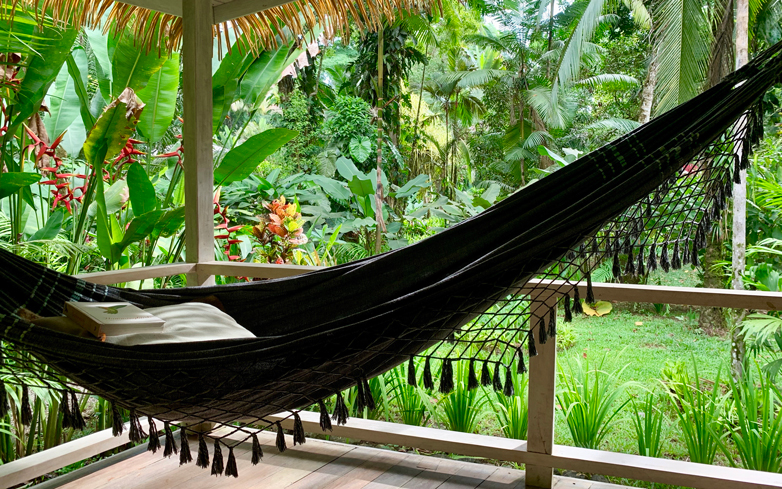
Golfo Dulce Retreat
Where: Osa Peninsula, Costa Rica
Instagram: @gdretreat
Why it’s special: The Osa Peninsula’s remote location on Costa Rica’s Pacific coastline makes the four-cabin Golfo Dulce Retreat accessible only by private boat from the mainland. According to owners Simon and Chantelle Mezzanotte, the property protects 1,000 acres of tropical jungle where the rainforest meets the ocean.
How it’s doing good: Their approach to sustainability addresses reforestation, coral reef restoration, and wildlife conservation. Dining menus are fixed to reflect available ingredients and all of the retreat’s food is made from scratch.
“Behind the scenes, we meet our entire energy demand through a small, carbon-free hydro turbine fed by rainforest springs,” Simon explains. “The same waters also feed the jungle pool, as well as the private plunge pools and outdoor showers before flowing into the wildlife ponds. All wastewater is treated naturally, and all structures are lit with warm LED for minimal energy consumption.”
The view: Toucans, red-eyed tree frogs, squirrel monkeys, hummingbirds, scarlet macaws and other native animals can be seen (or heard) from the observation deck. Guests can even discuss the flora and fauna with the retreat’s resident biologist.
Simon describes the view from the terrace as “the perfect place to enjoy a unique view of lush tropical gardens surrounding a spectacular jungle pool, with pristine rainforest mountains providing a stunning backdrop.”
Explore: Four years ago, Simon and Chantelle established the retreat in this exquisite location to share their passion for the natural world and offer a unique place to get in touch with nature through meditation and yoga. Golfo Dulce was recognized by legendary oceanographer Dr. Sylvia Earle as an “exceptional ecosystem” for marine biodiversity.
“Golfo Dulce is one of the last remaining frontiers for authentic and inspirational adventure in one of the most biologically intense corners of the planet,” he says.
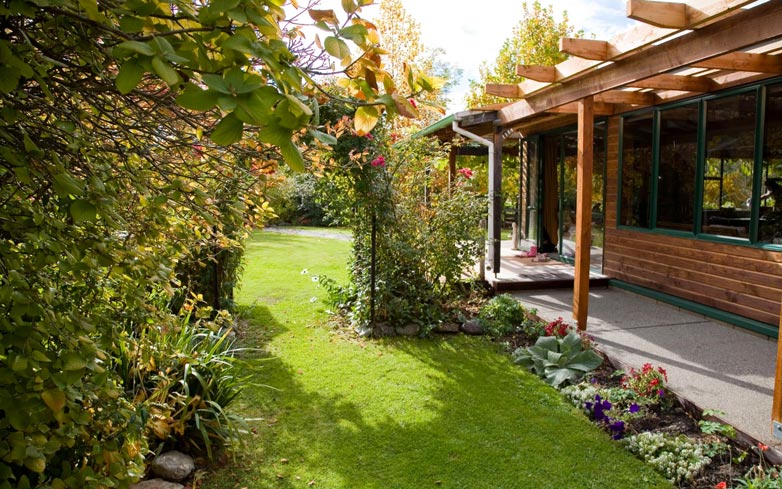
The Orchard House
Where: Cromwell, New Zealand
Instagram: @ the_orchard_house_bb_cromwell
Why it’s special: Fleur and Brendan Casey purchased the bed and breakfast, which was constructed in the 1960s and is located under an hour from Queenstown and Wanaka, in 2018.
“Our goal was to find a property that would make our guests feel like they have arrived at their home away from home, where you can just relax and soak it all in, or be as active as you choose, during any season of the year,” Fleur says.
How it’s doing good: The Caseys grow organic apricots, figs, apples, pears, olives, green gage plums and yellow plums on their property. They sustain other local businesses with their produce by growing yellow plums for use in commercially sold hot yellow plum chutney.
The view: Guests soak inthe expansive garden view from balconies off of each room, where the open design brings the surrounding greenery right to the terraces. Fleur especially loves waking up to the sound of tuis, native New Zealand birds that sing at daybreak.
“It was a unique sound that I was not used to coming from our property in Queenstown, and it’s something that I now cherish.”
Explore: The family-owned and -operated B&B is located in the middle of rural South Island, near the picturesque Lake Dunstan. The garden is in full bloom during the spring and summer (September – March) and four nearby ski resorts are within easy access during the winter months (May – August).
“Our property borders The 4 Barrels Walking Wine Trail, a three-hour walking tour where they can enjoy Misha’s Vineyard, Aurum Wines, Scott Base and Wooing Tree Wines,” Fleur says.
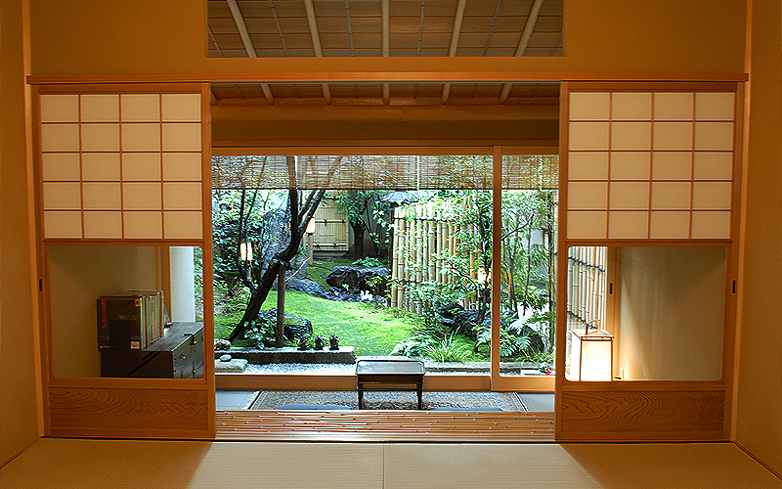
Kanamean Nishitomiya
Where: Kyoto, Japan
Instagram: @kanameannishitomiya
Why it’s special: In partnership with his wife, Kazuo Nishida is a fifth-generation owner and operator of the boutique hotel, which was established in central Kyoto in 1873. The seven-suite property offers a quiet oasis near well-known local spots like the Nishiki food market in the historic artistic fan-producing neighborhood of Honeyanocho.
How it’s doing good: The Nishidas are conscious about reducing food waste by vacuum-sealing and refrigerating ingredients so they can be used efficiently.
“We also provide our guests with bathroom amenities in large reusable bottles,” Kazuo noted. “Unlike other hotels which use small, single-use bathroom amenities in mini-plastic bottles, we refill ours so they can be reused.”
The view: “This kanamean garden elicits a spiritual relationship with nature,” Kazuo says.
Tsubo niwa, vases used in Japanese tea ceremonies, line the border between the terrace and garden. “Guests feel the peace and harmony when looking out into the garden from the terrace,” says Kazuo.
Explore: The Nishidas recommend visiting in March for the spring, or Sakura, season to experience the blossoms in the garden and around the city. Later in the year, Kazuo encourages guests to experience the beautiful color palette of changing red autumn leaves.
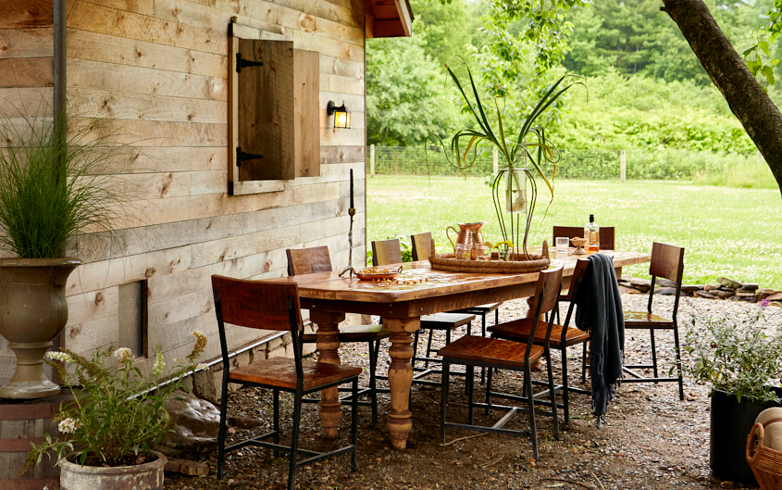
June Farms
Where: West Sand Lake, New York
Instagram: @junefarms
Why it’s special: About a year after purchasing a farm in upstate New York’s Capital Region, restaurateur Matt Baumgartner decided to take his business to the next level. What better way to pay off a farm mortgage than to open it up to the public?
Guests at June Farms can get involved in daily life by helping out with chores or visiting with the animals, and B&B-style hospitality compliments the cabins frequented by writers, artists and tourists seeking seclusion and solace year-round.
“The farm was supposed to be a place for me to live off of, but I quickly realized that people wanted to be outside and be around farm animals.”
How it’s doing good: Matt channels the joy people experience on the farm into a unique business combining agriculture and tourism. Guests can feed the cows, pigs, horses, goats and chickens as they all live out their happy lives — June Farms focuses on promoting local businesses by supporting other farms in the area that raise livestock for consumption. The farm also features a honey-producing beehive and buildings constructed using local lumber.
The view: The cabins are nestled between rolling fields and woodland, allowing guests to unwind on rustic patios. Pastoral sights and sounds abound where Scottish Highland cows graze during the day and the Pony Barn event space sparkles under hanging lights at night.
“We have a chef onsite to provide meals for guests who are staying in the cabins, or they can come down to the snack bar or to the seasonal Pony Barn,” Matt explains.
Explore: June Farms is located between Albany, the state capital, and the lake- and mountain-filled corners of rural Rensselaer County that first attracted Matt to the area. There is much to explore nearby, but it’s tough to leave the farm itself, which defies typical stereotypes.
“People think of farms as dirty and messy,” Matt says. “I think guests are surprised by the modern, chic, clean, simple feel that everything has, as opposed what you’d envision a typical farm to be.”



